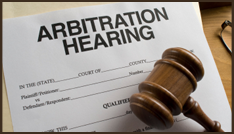 On December 21, 2020, the Supreme Court of New Jersey refused to enforce a lawyer-client arbitration clause because the lawyer failed give the client an “explanation of the advantages or disadvantages of arbitration.” See Delaney v. Dickey, No. 083440 (Dec. 21, 2020). Said the court:
On December 21, 2020, the Supreme Court of New Jersey refused to enforce a lawyer-client arbitration clause because the lawyer failed give the client an “explanation of the advantages or disadvantages of arbitration.” See Delaney v. Dickey, No. 083440 (Dec. 21, 2020). Said the court:
We conclude that the professional and fiduciary obligation imposed on a lawyer by RPC 1.4(c) — to “explain a matter to the extent reasonably necessary to permit the client to make informed decisions regarding the representation” — requires that the lawyer discuss with the client the basic advantages and disadvantages of a provision in a retainer agreement that mandates the arbitration of a future fee dispute or malpractice claim against the attorney. . . . Attorneys can fulfill that requirement in writing or orally — or by both means.
Id. at 39. Because the lawyer failed to provide the client with “an explanation of the advantages or disadvantages of arbitration, we hold that the present malpractice action is not subject to the arbitration provision of the [lawyer’s] retainer agreement.” Id. at 47.
The Louisiana Supreme Court has given Louisiana lawyers clear guidance as to how to draft an enforceable arbitration agreement. In Hodges v. Reasonover, 103 So. 3d 1069 (La. 2012), the court noted that a lawyer-client arbitration clause “does not inherently limit or alter either party’s substantive rights; it simply provides for an alternative venue for the resolution of disputes,” and held that a “binding arbitration clause between an attorney and client does not violate Rule of Professional Conduct 1.8(h) provided the clause does not limit the attorney’s substantive liability, provides for a neutral decision maker, and is otherwise fair and reasonable to the client.” Hodges, 103 So. 3d at 1076.
However, the court set forth several terms required for the enforcement of arbitration clauses. At a minimum, an arbitration clause must inform the client:
- That the client waives the right to a jury trial;
- That the client waives the right to an appeal;
- That the client waives the right to broad discovery under the Louisiana Code of Civil Procedure and/or Federal Rules of Civil Procedure;
- That arbitration may involve substantial upfront costs compared to litigation;
- The nature of claims covered by the arbitration clause, such as fee disputes or malpractice claims;
- That the arbitration clause does not impinge upon the client’s right to make a disciplinary complaint to the appropriate authorities;
- That the client has the opportunity to speak with independent counsel before signing the contract.
See id. at 1077.
To download model engagement agreements that include Louisiana-compliant arbitration clauses, click here: Model Lawyer-Client Agreements.
